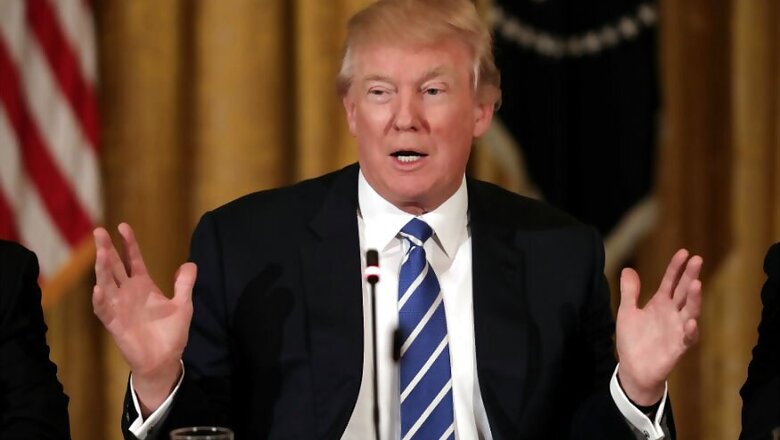
views
Washington: President Donald Trump's budget would drive millions of people off of food stamps, part of a new wave of spending cut proposals that already are getting panned by lawmakers in both parties on Capitol Hill.
All told, according to people familiar with the plan, Trump's budget includes $1.7 trillion over 10 years in cuts from such so-called mandatory programs. That includes cuts to pensions for federal workers and higher contributions toward those pension benefits, as well as cuts to refundable tax credits paid to the working poor. People familiar with the plan were not authorized to discuss it by name and requested anonymity.
The food stamp cuts are several times larger than those attempted by House Republicans a few years back and comprise the bulk of a 10-year, $274 billion proposal that's labeled as welfare reform.
The new cuts are unpopular as well.
"We think it's wrongheaded," said Rep. Mike Conaway, chairman of the House Agriculture Committee, when asked about looming cuts to farm programs. "Production agriculture is in the worst slump since the depression — 50 percent drop in the net income for producers. They need this safety net," said Conaway, R-Texas.
Instead, the Trump tax plan promises an overhaul that would cut tax rates but rely on erasing tax breaks and economic growth to end up as "revenue neutral." It would create three tax brackets — 10 percent, 25 percent and 35 percent — instead of the current seven.
Trump is also targeting the Medicaid health program that provides care to the poor and disabled, and nursing home care to millions of older people who could not otherwise afford it.
The House had a bitter debate on health care before a razor-thin 217-213 passage in early May of a GOP health bill that included more than $800 billion in Medicaid cuts over the coming decade. Key Republicans are not interested in another round of cuts to the program.
"I would think that the health care bill is our best policy statement on Medicaid going forward," said Rep. Greg Walden, R-Ore., chairman of the House Energy and Commerce Committee, which has jurisdiction over the program.
Details on Trump's budget will not be publicly released until Tuesday, but Mulvaney has briefed Republicans about what's coming and his staff has provided targeted leaks to the media.
An earlier blueprint from Trump proposed a $54 billion, 10 percent increase for the military above an existing cap on Pentagon spending, financed by an equal cut to nondefense programs. Those cuts rang alarm bells for many Republicans, who were particularly upset about proposals to eliminate community development block grants, slash medical research and eviscerate foreign aid.
Trump's GOP allies rejected such cuts when wrapping up long-overdue legislation for the current budget year, which ends Sept. 30. There's little sign they will have a change of heart now, especially with Trump's administration in turmoil and his poll ratings at historic lows.
"The budget's a starting point. We'll go to work from there," said Sen. John Hoeven, R-N.D., a member of the Senate Appropriations Committee.
Republicans controlling Congress have delayed action on their companion budget measure, waiting for Trump to go first. This year's budget debate, Republicans hope, would grease the way for a major overhaul of the loophole-cluttered tax system. But House conservatives also want to embark on a round of cuts to benefit programs and are open to Trump's suggestions for cuts to mandatory programs such as federal employee pensions.



















Comments
0 comment